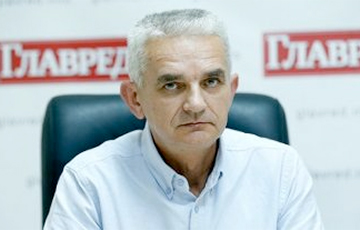"At Some Point, The Kremlin Will Simply Have Nothing To Fund The War"
1- 12.06.2025, 15:01
- 5,128

Photo: Glavred
Will Ukraine win the war of attrition?
Recently, many Western media outlets have been writing that Russia is fighting at the limits - both economically and militarily. Experts claim that we are allegedly approaching some important line when Russia will need a breather.
The Charter97.org website asked Alexei Melnyk, a military expert and co-director of foreign policy and international security programs at the Razumkov Center in Kiev, to comment on this information:
- The first thing to keep in mind is that all these assessments are quite conditional. Why? Because today's Russia is so closed that it can only be compared to the Soviet Union - when there are no reliable statistics, and even if they existed, it is not certain that they corresponded to reality.
Therefore, the spread of these estimates can be very significant, it can be a few months, or even a year or two. One thing can be said unequivocally - Russia's resources are not unlimited. But at the stage of the war that is now underway, it is a war of attrition, the key question is how long Ukraine will be able to withstand this race.
Yes, I agree, I note once again that Russia's resources are not infinite. We can talk here at least about the ability to financially support the war. Right now, with low oil prices, already a third, it seems, of Russian oil companies are operating at a loss. Two-thirds of coal companies are on the verge of bankruptcy or have already gone bankrupt.
In addition, we should take into account the current position of OPEC, primarily Saudi Arabia, to increase oil production. All this can add up, accumulate, and at some point Russia will simply have nothing to finance the war with. Even though Putin has a certain freedom to redistribute some social resources from major projects in favor of this obsession with war.
- The expression "war of attrition" has been heard very often lately. They say that modern wars end precisely when one side exhausts its resources. Will the war between Ukraine and Russia end in such a scenario?
- I would like to clarify: this is not only characteristic of modern wars. Before the advent of peacekeeping operations, wars usually ended in two ways. The first was when one side inflicted a crushing defeat on the other, and the winners forced the losers to sign a peace, if there was anyone to negotiate with.
The second was when both sides were so exhausted that it became less profitable to continue fighting than to stop. That is, this is not only a feature of modern conflicts - it has always been so, until there were no opportunities for external intervention.
In this case, as we have already said, Russia's resources are not unlimited. The question is when the current Russian leadership, or its successors, will realize that making peace will be a more profitable option than continuing a war that could lead to disaster. That is the big question.
As I have said, over the past at least 80 years of the existence of the United Nations and other international structures, such active intervention in conflicts has rarely led to truly positive results. More often than not, the warring parties have simply been forced into some kind of truce, a freeze on the conflict.
So now this factor of external intervention is being added. If the current White House administration would change its position and would not distribute pressure on both sides, but would concentrate on the aggressor, the format of the end of the war would change.
- What are the main steps to be taken to make Russia run out of resources?
- First, it is worth showing Russia that it will not be able to achieve its goal. The Kremlin has already been repeatedly frightened with "hellish" sanctions, and the US has such possibilities, Europe has them. But the result can only be achieved by joint efforts.
For example, let's take the frozen 300 billion dollars of Russian assets. The U.S. requires Europe to make a decision on confiscation of these funds, but Europe is resisting for various reasons.
Secondly, Europe is now taking a more active role, but without U.S. support, the effectiveness of European sanctions is reduced many times over. That is, the international community has such opportunities to force Russia. But this requires leadership and joint efforts on the part of both the United States and, first and foremost, the European Union.











